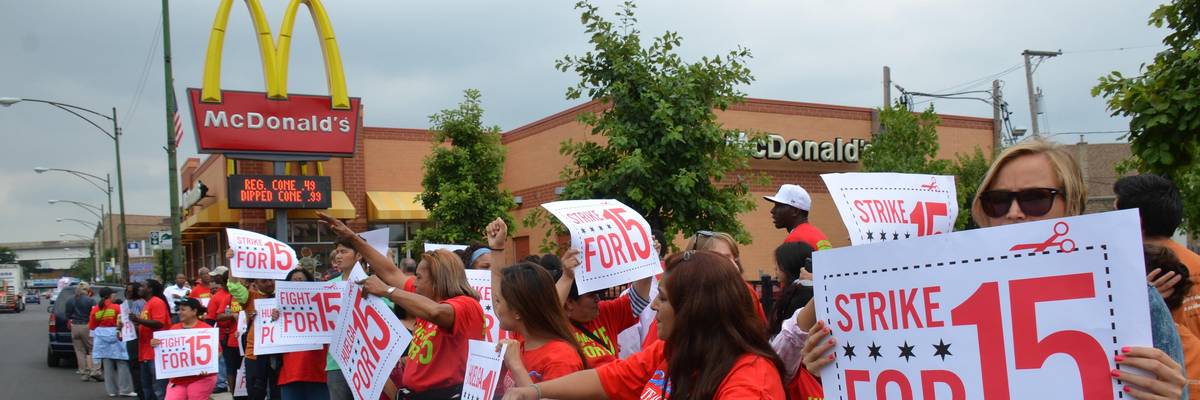

SUBSCRIBE TO OUR FREE NEWSLETTER
Daily news & progressive opinion—funded by the people, not the corporations—delivered straight to your inbox.
5
#000000
#FFFFFF
To donate by check, phone, or other method, see our More Ways to Give page.


Daily news & progressive opinion—funded by the people, not the corporations—delivered straight to your inbox.

Workers demanding $15 an hour protest outside a McDonald's restaurant. (Photo: Steve Rhodes/CC BY-NC-ND 2.0)
Just months after her now-infamous thumbs-down vote on a similar measure at the federal level, the people of U.S. Sen. Kyrsten Sinema's hometown of Tucson, Arizona overwhelmingly approved a ballot initiative on Tuesday to increase the city's minimum wage to $15 an hour.
According to unofficial results posted by the city, Proposition 206 passed with approximately 60% of the vote compared to roughly 32% who rejected it.
Passage means Tucson's minimum wage will incrementally bump up from its current $12.15 to $15 by January 1, 2025. Tucson Fight for $15 led the campaign in support of it.
A right-wing Democrat who's obstructed multiple progressive legislative priorities, Sinema (D-Ariz.) drew strong criticism in March when she voted, along with six other Democrats, against including a $15 federal minimum wage provision in the Senate's Covid relief budget reconciliation package. Increasing the federal minimum wage to $15 is overwhelmingly supported by Democratic voters, according to recent polling by Data for Progress.
In a Monday op-ed encouraging voters to back Proposition 206, Arizona Republic columnist Elvia Diaz wrote that voting yes should be "a no-brainer" for Tucson voters. She argued that even "$15 per hour is hardly a living wage" and that critics' arguments that the wage increase would unleash a "bureaucratic nightmare" were baseless.
"Those chamber-of-commerce types will always oppose paying workers more," she wrote, "no matter what."
Dear Common Dreams reader, The U.S. is on a fast track to authoritarianism like nothing I've ever seen. Meanwhile, corporate news outlets are utterly capitulating to Trump, twisting their coverage to avoid drawing his ire while lining up to stuff cash in his pockets. That's why I believe that Common Dreams is doing the best and most consequential reporting that we've ever done. Our small but mighty team is a progressive reporting powerhouse, covering the news every day that the corporate media never will. Our mission has always been simple: To inform. To inspire. And to ignite change for the common good. Now here's the key piece that I want all our readers to understand: None of this would be possible without your financial support. That's not just some fundraising cliche. It's the absolute and literal truth. We don't accept corporate advertising and never will. We don't have a paywall because we don't think people should be blocked from critical news based on their ability to pay. Everything we do is funded by the donations of readers like you. Will you donate now to help power the nonprofit, independent reporting of Common Dreams? Thank you for being a vital member of our community. Together, we can keep independent journalism alive when it’s needed most. - Craig Brown, Co-founder |
Just months after her now-infamous thumbs-down vote on a similar measure at the federal level, the people of U.S. Sen. Kyrsten Sinema's hometown of Tucson, Arizona overwhelmingly approved a ballot initiative on Tuesday to increase the city's minimum wage to $15 an hour.
According to unofficial results posted by the city, Proposition 206 passed with approximately 60% of the vote compared to roughly 32% who rejected it.
Passage means Tucson's minimum wage will incrementally bump up from its current $12.15 to $15 by January 1, 2025. Tucson Fight for $15 led the campaign in support of it.
A right-wing Democrat who's obstructed multiple progressive legislative priorities, Sinema (D-Ariz.) drew strong criticism in March when she voted, along with six other Democrats, against including a $15 federal minimum wage provision in the Senate's Covid relief budget reconciliation package. Increasing the federal minimum wage to $15 is overwhelmingly supported by Democratic voters, according to recent polling by Data for Progress.
In a Monday op-ed encouraging voters to back Proposition 206, Arizona Republic columnist Elvia Diaz wrote that voting yes should be "a no-brainer" for Tucson voters. She argued that even "$15 per hour is hardly a living wage" and that critics' arguments that the wage increase would unleash a "bureaucratic nightmare" were baseless.
"Those chamber-of-commerce types will always oppose paying workers more," she wrote, "no matter what."
Just months after her now-infamous thumbs-down vote on a similar measure at the federal level, the people of U.S. Sen. Kyrsten Sinema's hometown of Tucson, Arizona overwhelmingly approved a ballot initiative on Tuesday to increase the city's minimum wage to $15 an hour.
According to unofficial results posted by the city, Proposition 206 passed with approximately 60% of the vote compared to roughly 32% who rejected it.
Passage means Tucson's minimum wage will incrementally bump up from its current $12.15 to $15 by January 1, 2025. Tucson Fight for $15 led the campaign in support of it.
A right-wing Democrat who's obstructed multiple progressive legislative priorities, Sinema (D-Ariz.) drew strong criticism in March when she voted, along with six other Democrats, against including a $15 federal minimum wage provision in the Senate's Covid relief budget reconciliation package. Increasing the federal minimum wage to $15 is overwhelmingly supported by Democratic voters, according to recent polling by Data for Progress.
In a Monday op-ed encouraging voters to back Proposition 206, Arizona Republic columnist Elvia Diaz wrote that voting yes should be "a no-brainer" for Tucson voters. She argued that even "$15 per hour is hardly a living wage" and that critics' arguments that the wage increase would unleash a "bureaucratic nightmare" were baseless.
"Those chamber-of-commerce types will always oppose paying workers more," she wrote, "no matter what."